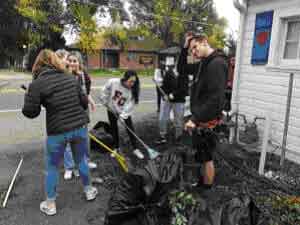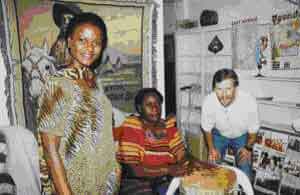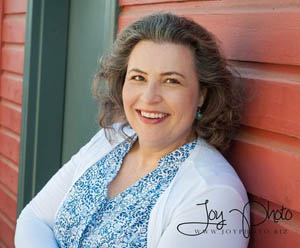The Compelling and Inspirational Ministry Full Story
The Beginning
For decades, founder, Kimary Marchese desired to buy a home property large enough to serve as a place of hospitality for visiting missionaries. The 2001 discovery of a wonderful property, possessing every quality on the “needs-list”, made her feel the time had come to see that hope become a reality.
Discovering the Property
There it stood with its charming Old West storefront, a main house with a pillared front porch, an overhead apartment with its windows peeking out over the trailing wisteria, chicken coops, outhouse and wonderful two-bedroom cottage to the west. It was undeniably an attention-getter.
The realtor immediately cautioned that it was a very high-maintenance property. An offer was made and she was set to close in September on a charming 1872 property that included several structures with an old-west ambiance. The contract was ratified and the financing pre-qualification confirmed. Unfortunately, that fateful day, now known as 9/11, caused the original funding source to back out.
The contract expired with no further financing options. Just when it looked like the property was lost, the realtor connected the founder with a man from his Kiwanis Club. This man offered to fund the property for one year. By the end of that year, the entire “complex” needed to be adequately renovated to attract a traditional funding source or lose the property along with the year’s worth of sweat equity and the $40,000 put into the improvements.
The prospect of having to do such extensive renovations in less than one year made it seem like an extraordinary risk.
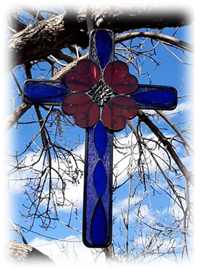
" It was like having a front-row seat to a miracle! "
Prayers for the Right Decision
Next, 40 people came to pray over the property for wisdom. That time of prayer helped Kimary to decide to take the risk. She knew that what was originally supposed to be a 30-year project was now, out of necessity, becoming a 10-month project! She also knew it could not be done alone.
The current owner lived too far away to keep the place in shape but knew most prospective buyers were only interested in the commercial zoning and might tear down the beloved historic structures. In fact, Ms. Bongers had technically taken it off the market for that reason and initially did not respond to further requests to show the property when Ms. Marchese first inquired.
The founder and her realtor were perplexed by the lack of response from the seller’s realtor. She prayed over it and felt lead to include her Buffalo Bill Museum exhibitor’s business card and a photo of her and a friend in reproduction Victorian attire. The realtor admitted it was a quirky request, but he submitted an offer including the card and photo and Susan Bongers accepted the offer. Ms. Bongers admitted at the closing that the founder’s love of history, as demonstrated by her profession and history reenacting photo, convinced her that if ever there was a buyer she could trust to preserve the original character of the property, this was it. Mrs. Craig Bongers even agreed to sell it for less money than a previous offer.
A New Vision
From the beginning, the founder knew she would need to restore the residential units to rent. Her desire was to host Christian missionaries, primarily in the detached cottage. When that wasn’t available, she would share the main house. The long-term goal still is that one day, all the property’s units, including the cottage, will house missionaries or full-time, Christian, non-profit workers.
The property closed with the temporarily financing on Thanksgiving weekend 2001. While scores of volunteers worked on the rest of the property, the new apartment tenant fixed up the one-bedroom, river view overhead apartment at their own expense.
A Contagious Vision
The men’s group from New Community Christian Church in Denver was the first to embrace the vision. They volunteered on Saturday mornings for several months. They did everything from finishing off the collapsing “barn”, to propping up the mailbox, to stripping off 4 layers and 130 years’ worth of flooring in the main house.
From there, others began to catch the vision. A carpenter and member of Arvada Covenant Church began organizing friends from the church’s singles group and started to work on the missionary guest cottage.

Another volunteer was a manager at LL Johnson, the sprinkler company. In addition to adding a great pond and fountain, he made the yard a poster child for a special underground drip system that rooted new sod in record time and saved 65% over the normal sod watering bill! Since all this was being done during a drought, it was critical to getting the water board to grant special permission to bypass drought planting restrictions and allow the new landscaping to take place. That same volunteer began converting the old chicken coop, turned coalhouse, into a garden prayer chapel.
The Projects
The former storefront was a project for the Foothills Bible Church youth group. Additionally, a woman who was a member of Wheat Ridge’s Harvest Christian Community salvaged the original blue and red heart shutters on the cottage. And various people began building a gazebo. One of the founder’s favorite days was when farm kids from the Hudson, Keenesburg and Fort Lupton communities were let go with chain saws and a borrowed tractor. They cleared the land then played video games. The tractor was borrowed from Lindgren Landscaping-owned by a man who had never even met the founder nor seen the property!
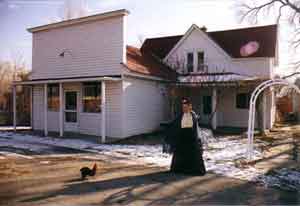
City-wide Support
Many people contributed much to a project that had no guarantee of succeeding. Sometimes complete strangers would knock on the door and say, “I heard you need help”. Every profession imaginable showed up as needed: from a commercial electrician from Heritage Christian Center to an engineer from Church in the City. All total, more than two-dozen churches and civic groups, not to mention countless individuals, contributed to the transformation of this property. And that was just the first year. Not everyone volunteered, but even the paid help was usually greatly discounted.
The project manager nicknamed “Michael the Angel” had people drive right up to the project and ask to hire him away at more than double what he was being paid for coordinating the renovation. He would not budge from PVH. He was determined to make the reappraisal and financing deadline and remained devoted to PVH the rest of his life.
Even the City of Wheat Ridge zoning department seemed to be rooting for the project—going the extra mile to explain what was needed for every step and each permit. It seemed like the whole community loved and supported the revitalization of the property.
Then with hardly a few weeks to spare the property was reappraised with enough equity to bring the risk level of the loan down. After a talk with the CEO of ASFCU, now named The District credit union, the permanent financing came just in the nick of time. The improvements to the property that first year far exceeded everyone’s expectations. The founder is quoted as saying, “It was like having a front row seat to a miracle!”.
Build It and They Will Come – The Missionaries
The first visiting missionaries were from an orphanage in Uganda, Africa before the cottage was even renovated. They had to “camp out” in the main house. Soon thereafter, there were contacts from Tibet, Ghana, France, Kenya, Ireland, Peru, Korea, Namibia, Kazakhstan, Malaysia, Rwanda, England, Columbia, American relief workers for Honduras, Romania and workers on Native American Indian Reservations! Even Catholic nuns from Guatemala have stayed at Prospect Valley Hospitality, Inc.
Housing Katrina Hurricane victims birthed the creation of a temporary studio (in-law apartment) in the former storefront connected to the main house. Years later insufficient income and the enormous expense of the property up-keep caused PVH to go up for sale in 2014. The salvation of the vision was the last-minute realization that the 2-bedroom cottage needed to be used to bring in more rent support for the property which would enable a refinance. The missionary use needed to move exclusively into the former storefront. In 2014 $10,000 was invested in converting the former storefront into a better configuration for a Studio in-law apartment for ministry guests. As of today, two units have been converted to missionary housing, the upstairs apartment and the studio.
Beauty for Ashes
It seems that God wants to make sure we recognize PVH as His handy-work and not just that of human hard work. PVH came into existence during the 9/11/2001 tragedy. Then, during the 2020-2022 worldwide COVID pandemic PVH made several great strides forward. Under the coordination of PVH Board member and on-site volunteer, Vicki Finney, the isolated strip of land on the East end of the property was transformed into the ministry garden. This long-neglected area was part of a stalled, 20-year vision. Under the oversight of Vicki, the area was converted into the Ministry Silent Prayer and Reflection gardens, affectionately nicknamed “The Secret Garden”.
Additional advancements were made toward the ministry goals with the help of Air BnB and Kimary's teaching salary. The upstairs unit is now furnished for ministry use, new electric and plumbing in the studio apartment enabled installation of a washer, and PVH has launched a new website. It seems that many of the PVH great strides come at highly unlikely times.
It is still the long-term goal that one day the non-profit will bring in enough support that all the units can be dedicated to housing Christian workers. Only God knows what lies in “store” for the future.





